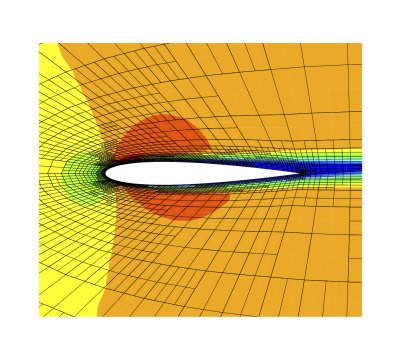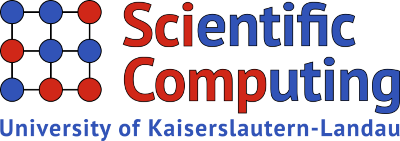Optimal Design with Bounded Retardation for Problems with Non-separable Adjoints
In this project, we focus on the development of mathematical methods and algorithmic techniques for the transition from simulation to optimization with PDEs. Typical applications come from aerodynamics and climatology. The methodologies are applicable to all areas of scientific computing, where large scale PDEs are treated by fixed-point solvers. To exploit the domain specific experience and expertise invested in these simulation tools we extend them in a semi-automated ’one-shot’ fashion. First they are augmented with an adjoint solver to obtain approximate, reduced derivatives and then this sensitivity information is immediately used to determine design corrections. The direction and size of these optimization steps are determined by a carefully selected design space preconditioner.
To complete an optimization run in a small multiple of the number of iterations required for a simulation run, it must be ensured that the contractivity factor of the combined ’one-shot’ scheme is only a certain fraction closer to 1 than that of the user supplied fixed-point solver. This property we call as bounded retardation of the convergence speed of a one-shot optimization compared to just a simulation. On a classical example with separable adjoints, the bounded retardation can be shown explicitly. We plan to extend these theoretical results to non-separable problems. Such non-separability arises typically when the design variables enter in a truly nonlinear fashion, especially in shape optimization.
Partners: Humboldt University Berlin, CAU Kiel
Funded by DFG under the Priority Program 1253 on Optimization with Partial Differential Equations
Contact: Dr. Anil Nemili, Dr. Emre Özkaya and Prof. Nicolas R. Gauger
Robust Aerodynamic Design with Discontinuous Galerkin Methods on High-Performance Computer Architectures
By now the numerical optimization is one central aspect in aerodynamics. Often one already reaches the bounds of existing computing capacities. And moreover for robust design it is necessary to introduce uncertainties. Therefore fast solver and optimization strategies on modern computer architectures are needed.

The Scientific Computing Group aims at finding efficient optimization strategies for aerodynamic design. Discretization approaches based on the discontinuous Galerkin method coupled with One-Shot strategies are well suited fort this. In detail, the discontinuous Galerkin solver PADGE by the DLR offers a solution of the state as well as the adjoint equation necessary for optimization. Based on this, we want to set up an One-Shot optimization strategy, i.e. solving state, adjoint state and design update simultaneouly. For the update in the design, sensitivities as well as a suitable preconditioner are needed. The derivative information needs to be calculated and implemented using shape calculus. The preconditioner needs to be developed in the DG context and implemented with the help of Algorithmic Differentiation (AD). Furthermore the One-Shot method is supposed to be extended by an adaptive strategy. After every step in the state, the adjoint state and the design, the mesh is refined using a dual weighted residual error estimator. Essential for this is the behaviour of the optimization method on arbitrarily fine meshes. A convergence analysis of the One-Shot method in a Hilbert space setting and a mesh independent behaviour is therefore important.
Partners: University of Trier, German Aerospace Center (DLR), Airbus, MTU Aero Engines
Funded by Federal Ministry of Education and Research (BMBF), Project DGHPOPT
Contact: Matthias Sonntag and Prof. Nicolas R. Gauger
